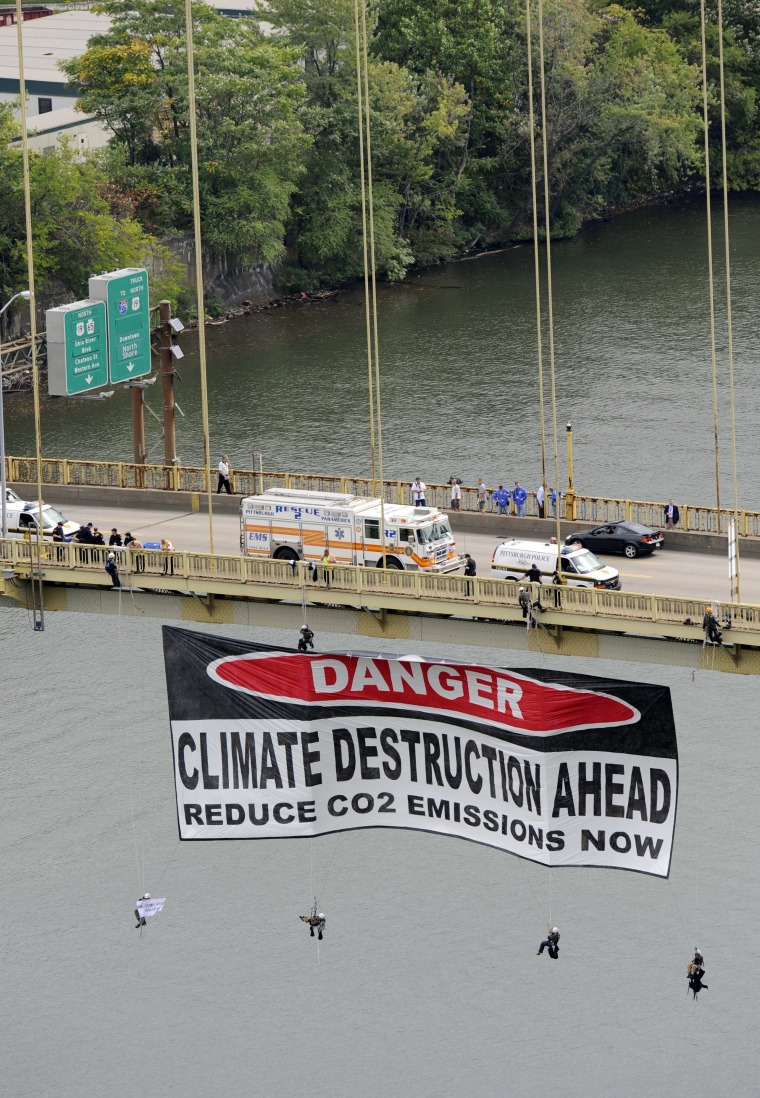On the eve of a summit of the world’s 20 top economies, the Obama administration pressed leaders on Wednesday to overcome differences and work together more closely in confronting thorny financial and environmental problems.
“We simply cannot walk away from the worst financial crisis since the Great Depression and not do everything in our power to reform the system that contributed to this breakdown,” Treasury Secretary Timothy Geithner told a congressional panel in Washington.
President Barack Obama, delivering his first speech to the U.N. General Assembly in New York, urged world leaders to join him in confronting an abundance of global challenges.
“Those who used to chastise America for acting alone in the world cannot now stand by and wait for America to solve the world’s problems alone,” he said. Obama was to arrive in Pittsburgh Thursday afternoon. The summit will conclude Friday.
Leaders gathering here face daunting challenges in overcoming differences on major issues ranging from restraining bankers’ bonuses to overhauling financial regulation and plotting a future course for sustainable growth as the worst of the downturn appears to be over.
As some leaders began arriving, police said 14 members of the environmental group Greenpeace were arrested on two bridges. They faced various charges, including possession of an instrument of a crime, disorderly conduct, conspiracy and obstruction.
First, four environmental protesters rappelled off the West End Bridge over the Ohio River, dangling perilously over the water while steadying a large banner warning of “climate destruction” if world leaders don’t act to control carbon dioxide emissions. After about two hours, the protesters climbed safely back up to the bridge deck.
Police said they arrested nine in that episode. Police spokeswoman Diane Richard said five others wearing harnesses and preparing to rappel off another span, the Fort Pitt Bridge, also were arrested.
Although the U.S. has urged G-20 countries not to scale back stimulus spending programs just yet, it will be hard to maintain such a stance in light of recent improvements in all the major economies, including a far brighter assessment by Federal Reserve policymakers on Tuesday.
The Fed left interest rates unchanged at low levels while signaling a willingness to begin to unwind some of the rescue programs it established at the depth of the recession. “Economic activity has picked up following its severe downturn,” the Fed policymakers said, a more optimistic view than they issued in August when saying economic activity was “leveling out.”
Dominique Strauss-Kahn, head of the International Monetary Fund, warned that the earlier “cooperation took place because everybody was scared and understood it was not time to fight one against the other one, but to work together.
“Will it last beyond the crisis?” the IMF chief asked in an interview with PBS’ “News Hour with Jim Lehrer.” “That’s the big question. It has to for the sake of the global economy. Is it absolutely sure? I won’t say.”
Obama signaled he will use the G-20 summit to call for an end to extensive government subsidies that encourage the use of fossil fuels, such as oil, coal and natural gas, which are blamed for contributing to global warming, He will propose a gradual elimination, with the time frame to be determined, according to White House officials.
Many countries, including the U.S., provide tax breaks and direct payments to help produce and use oil, coal, natural gas and other fuels that spew carbon dioxide, the chief greenhouse gas. However, this proposal was likely to spark opposition from China and possibly some other major greenhouse gas emitters such as India and Russia.
Geithner, in an appearance before the House Financial Services Committee, warned against complacency amid signs of a global rebound. The panel was focusing on the administration’s sweeping overhaul of the U.S. financial system. But Geithner’s testimony echoed the appeal he and Obama are making to other members of the leading economies group.
The talks in Pittsburgh will be held under heavy security. Thousands of police were busy erecting security barriers along the streets around the convention center, the site of the gathering, on the Allegheny River. Many buildings and shops were closed. Police helicopters buzzed overhead. Most of downtown was to be closed to traffic on Thursday and Friday, as were the city’s three rivers.
Protesters have vowed to use the sessions as a stage to highlight their grievances against global capitalism.
There are many differences among the summit members. The gathering, which follows G-20 meetings last November in Washington and this past April in London, includes older industrial powers along with major fast-growing developing economies such as China, India and Brazil.
In the financial arena, the U.S. wants the other countries to adopt tougher rules on the size of the capital reserves banks must hold as a cushion against loan losses — which proved inadequate when the worst financial meltdown struck a year ago. But European countries argue that the U.S. proposal, as currently structured, would benefit U.S. banks at the expense of their European competitors.
However, the group is expected to endorse the U.S. call for a new “framework for sustainable and balanced growth,” but without any major way to enforce commitments made to restrain imbalances such as China’s huge trade surpluses and the United States’ surging budget deficits.
European countries are expected to push harder than the U.S. for specific caps on banker’s pay and bonuses. While China wants a greater role for it and other emerging economies and the U.S. has been pushing China’s cause in the face of opposition from European countries, which would have to give up some of its voting powers.
